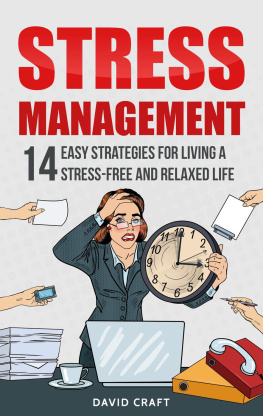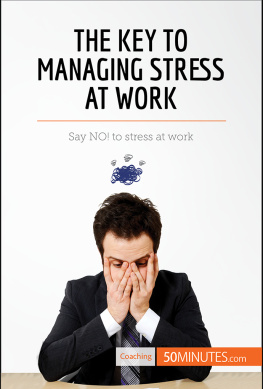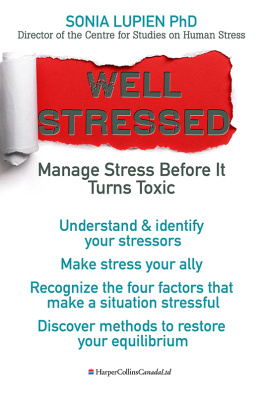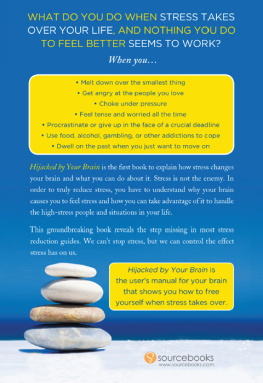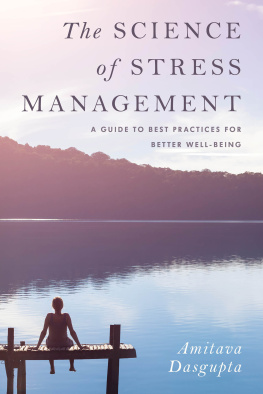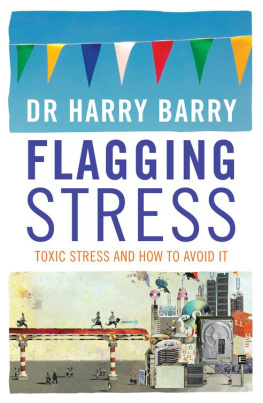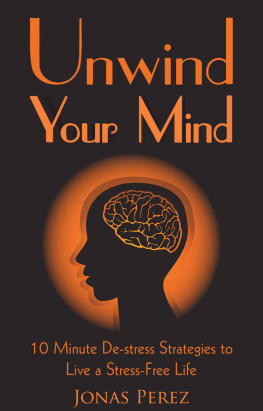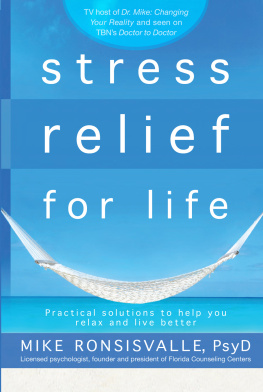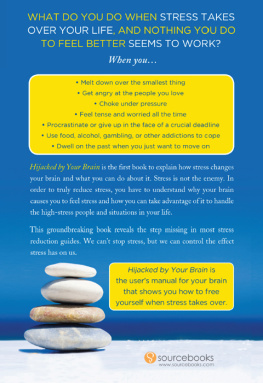Copyright 2012 by Sonia Lupien
All rights reserved. No part of this work covered by the copyright herein may be reproduced or used in any form or by any meansgraphic, electronic or mechanicalwithout the prior written permission of the publisher. Any request for photocopying, recording, taping or information storage and retrieval systems of any part of this book shall be directed in writing to the Canadian Copyright Licensing Agency (Access Copyright). For an Access Copyright license, visit www.accesscopyright.ca or call toll free 1-800-893-5777.
Care has been taken to trace ownership of copyright material contained in this book. The publisher will gladly receive any information that will enable them to rectify any reference or credit line in subsequent editions.
Wiley publishes in a variety of print and electronic formats and by print-on-demand. Some material included with standard print versions of this book may not be included in e-books or in print-on-demand. If this book refers to media such as a CD or DVD that is not included in the version you purchased, you may download this material at http://booksupport.wiley.com . For more information about Wiley products, visit www.wiley.com .
Library and Archives Canada Cataloguing in Publication Data
Lupien, Sonia, 1965
Well stressed: how you can manage stress before it turns toxic / Sonia Lupien.
Translation of: Par amour du stress.
Includes bibliographical references and index.
Issued also in electronic format.
ISBN 978-1-118-27360-9
1. Stress management. 2. Stress (Psychology).
3. Stress (Physiology). I. Title.
RA785.L8613 2012 616.98 C2012-901340-4
978-1-118-27956-4 (ebk); 978-1-118-27955-7 (ebk); 978-1-118-57987-1 (ebk)
Production Credits
Cover design: Adrian So
Typesetting: Thomson Digital
Cover image: Adrian So
Editorial Credits
Executive editor: Robert Hickey
Managing editor: Alison Maclean
Production editor: Jeremy Hanson-Finger
John Wiley & Sons Canada, Ltd.
6045 Freemont Blvd.
Mississauga, Ontario
L5R 4J3
To my father, who taught me to hunt mammoths.
To my husband, who often hunts them for me.
To my children, for whom I would kill a mammoth with my bare hands.
Acknowledgments
I would like to thank personally all the graduate students who have volunteered their services since the Centre for Studies on Human Stress was founded in 2004 to ensure the center's success:
Alexandra Fiocco, PhD
Nathe Franois, PhD
Robert Paul Juster, MSc, doctoral candidate
Marie-France Marin, MSc, doctoral candidate
Pierrich Plusquellec, PhD
Tania Schramek, MSc
Shireen Sindi, MSc, doctoral candidate
Lyane Trpanier, BSc
Nathalie Wan, MSc
And I don't want to forget:
Genevive Arsenault-Lapierre, MSc
Laura Cooper, BSc
Anne Hand, BSc
Benjamin Lai, MSc
Kamala Pilgrim, MSc
Introduction
My publisher was getting impatient as he awaited this book, which it seemed was never going to be finished. I tried to explain all the competing demands on me: my science laboratory where we do research into stress, my teaching at the university, my children, my household and various unexpected events, not to mention the time required for my students. This all leaves me feeling that I'm under heavy time pressure. But even with this pressure, I don't usually feel stressed. On the contrary, I love the feeling of intensity and achievement that goes with getting something done: the conclusion of a major task or the successful completion of a student's doctoral thesis.
Let's keep in mind that I'm the sort of person who talks at a hundred words a minute. I gesticulate constantly and move quickly. I do everything fast, so much so that the people around me conclude (and they don't hesitate to tell me) that I must be operating at maximum stress. However, in the heat of the action, I don't feel stressed at all, although I can easily see that the way I carry on may stress those around me. That's a whole other matter!
One day, one of my research colleagues and I had agreed to have the walls of one of our research laboratories painted bright orange. Most of the people who came by our workplace were quick to tell us that we really did need to do stress research if we didn't know that painting a wall bright orange is not the least bit Zen. Many of them added that this bright orange color would cause stress for everyone, not just the people in the lab but even those just passing by.
My standard answer was that this kind of comment showed a poor understanding of stress. Zen is not a surefire antidote to stressin fact, an infallible stress antidote simply doesn't exist. You can paint every wall in your house a gloomy beige, but that won't eliminate the stress that may keep you awake at night now and again. I'm utterly convinced of this. Like everyone else, I too experience stress that has me ruminating from 11 p.m. to 3 a.m. and feeling grumpy and impatient the next morning. When this happens, my stress overflows onto my children and husband, sometimes leaving them bewildered by my mood shifts.
Not very long ago, I found myself on a television panel with a well-known doctor who'd written a book maintaining that with the seven or twelve methods he was suggesting, readers could cure their stress. When the host asked for my view on this, I answered with what 20 years of scientific research had taught me: stress is not an illness, and hence cannot be cured. Stress is a necessary reaction by the body, one that enables us to survive. Therefore, if you eliminate stress from your life, you end up dead. I also added that my colleagues and I, working in the field of stress, have increasingly come to recognize that all those self-help books on stress that promise to cure it, eradicate it or even wipe it out forever through all sorts of outlandish methods may, in fact, have a very harmful effect on your ability to control your stress. Indeed, the popularity of these books may help explain why so many people nowadays are stressed. In short, these supposed cures could just make things worse.
My interactions with the people I've tested in my scientific experiments have led me to understand that stress is the great unknown of our time. No matter how it's dressed up, stress has become the black sheep of our society, something that has to be made to go away. It's important to remember, though, that our brain's primary role is to detect danger. How would you react if you heard me say that, if we're really so very stressed nowadays, it's because our brain doesn't know that we're living in the twenty-first century and not in prehistoric times? And that because of this it doesn't differentiate between the danger from an enraged mammoth and the threat from an office colleague who constantly questions our ability to do our job properly?
Since your brain's primary role is to save your life, what would you say if I added that by generating a stress response each time you detect a threat, whether real or not, your brain really thinks it's helping you? Or if I said you can help your brain understand that the stressful situation or factor (the stressor) you face isn't a raging mammoth, and that once this is clearly understood by your brain, you'll see a decline in your stress reaction? Finally, would you be surprised to learn that a growing number of researchers in the field of stress are starting to believe seriously that, if our children are so stressed these days, it may be because we're overprotecting them, thereby preventing them from developing stress resistance?
All this has led me to develop a very clear message based on 20 years of research on human stress. I've got to make it clear right away that I have no magical recipe to offer you for controlling the stress in your life. Nor do I have any foolproof program consisting of seven or twelve scientifically proven approaches to cure your stress. There is no scientifically proven method that can help absolutely everyone control the stress in their lives, and I strongly doubt that any such method will be found.


